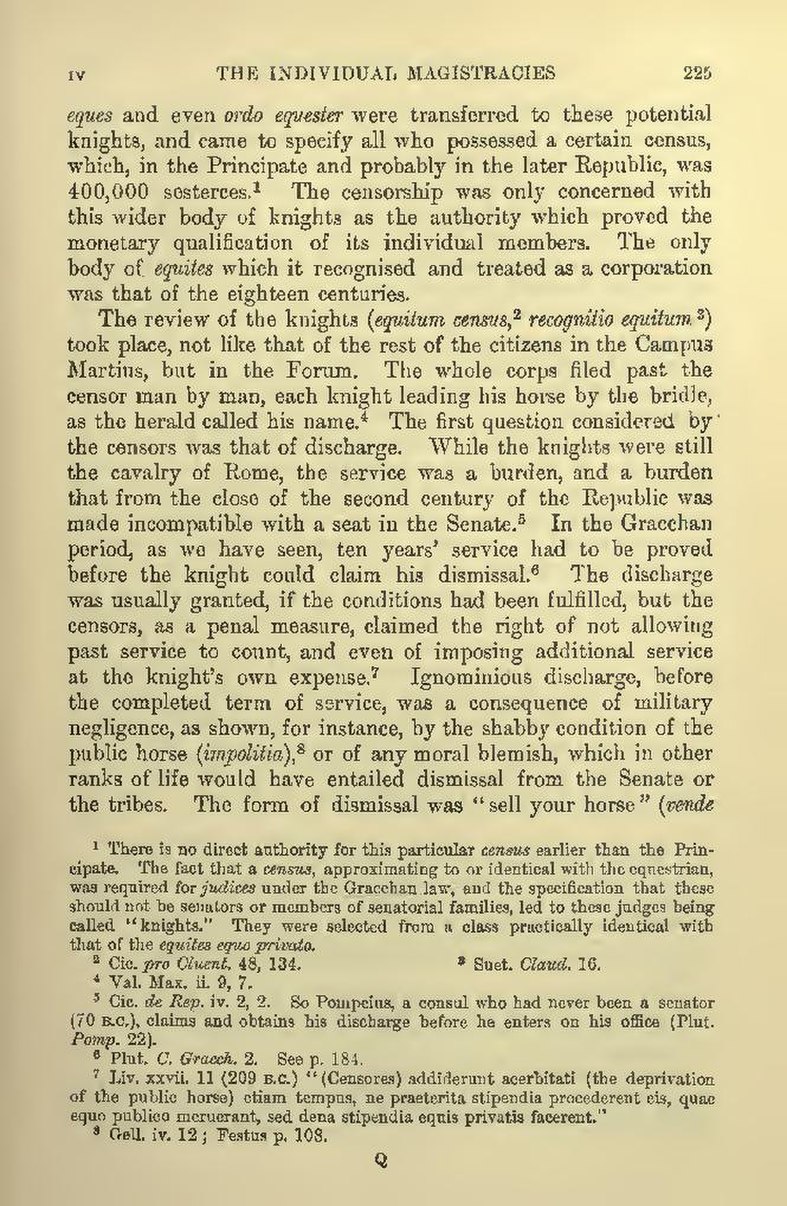eques and even ordo equester were transferred to these potential knights, and came to specify all who possessed a certain census, which, in the Principate and probably in the later Republic, was 400,000 sesterces.[1] The censorship was only concerned with this wider body of knights as the authority which proved the monetary qualification of its individual members. The only body of equites which it recognised and treated as a corporation was that of the eighteen centuries. The review of the knights (equitum census,[2] recognitio equitum[3]) took place, not like that of the rest of the citizens in the Campus Martius, but in the Forum. The whole corps filed past the censor man by man, each knight leading his horse by the bridle, as the herald called his name.[4] The first question considered by the censors was that of discharge. While the knights were still the cavalry of Rome, the service was a burden, and a burden that from the close of the second century of the Republic was made incompatible with a seat in the Senate.[5] In the Gracchan period, as we have seen, ten years' service had to be proved before the knight could claim his dismissal.[6] The discharge was usually granted, if the conditions had been fulfilled, but the censors, as a penal measure, claimed the right of not allowing past service to count, and even of imposing additional service at the knight's own expense.[7] Ignominious discharge, before the completed term of service, was a consequence of military negligence, as shown, for instance, by the shabby condition of the public horse (impolitia),[8] or of any moral blemish, which in other ranks of life would have entailed dismissal from the Senate or the tribes. The form of dismissal was "sell your horse" (vende
- ↑ There is no direct authority for this particular census earlier than the Principate. The fact that a census, approximating to or identical with the equestrian, was required for judices under the Gracchan law, and the specification that these should not be senators or members of senatorial families, led to these judges being called "knights." They were selected from a class practically identical with that of the equites equo privato.
- ↑ Cic. pro Cluent. 48, 134.
- ↑ Suet. Claud. 16.
- ↑ Val. Max. ii. 9, 7.
- ↑ Cic. de Rep. iv. 2, 2. So Pompeius, a consul who had never been a senator (70 B.C.), claims and obtains his discharge before he enters on his office (Plut. Pomp. 22).
- ↑ Plut. C. Gracch. 2. See p. 184.
- ↑ Liv. xxvii. 11 (209 B.C.) "(Censores) addiderunt acerbitati (the deprivation of the public horse) etiam tempus, ne praeterita stipendia procederent eis, quae equo publico meruerant, sed dena stipendia equis privatis facerent."
- ↑ Gell. iv. 12; Festus p. 108.
